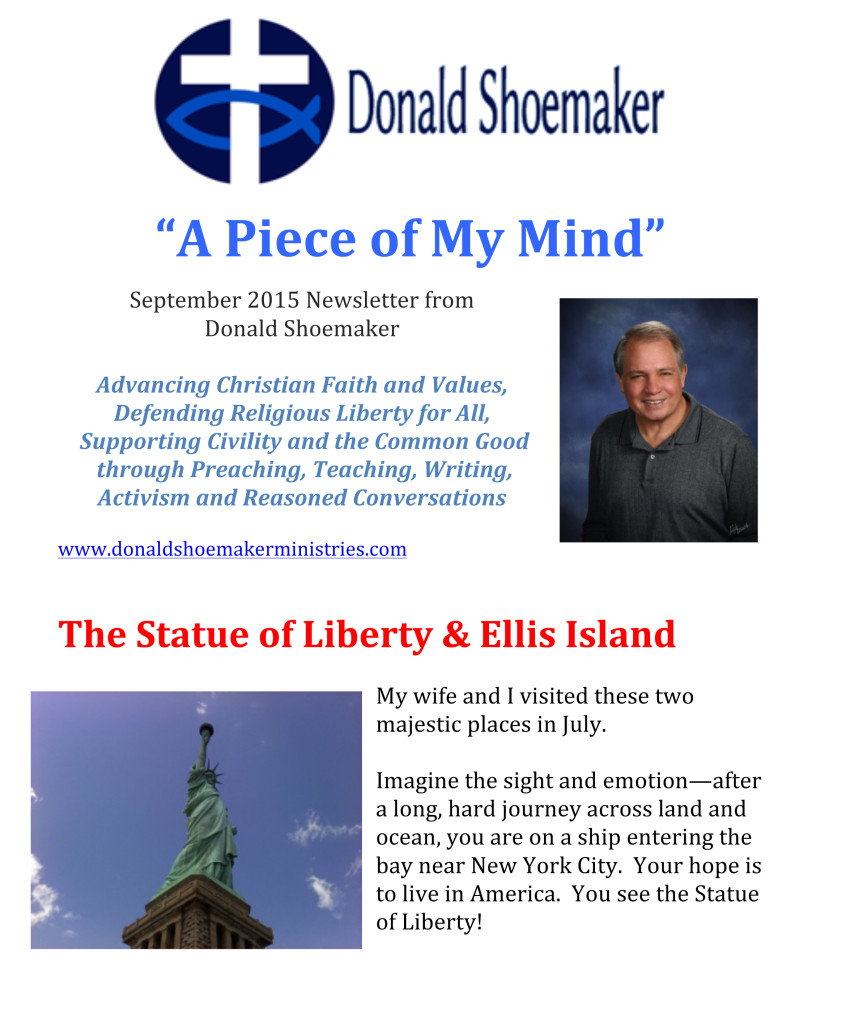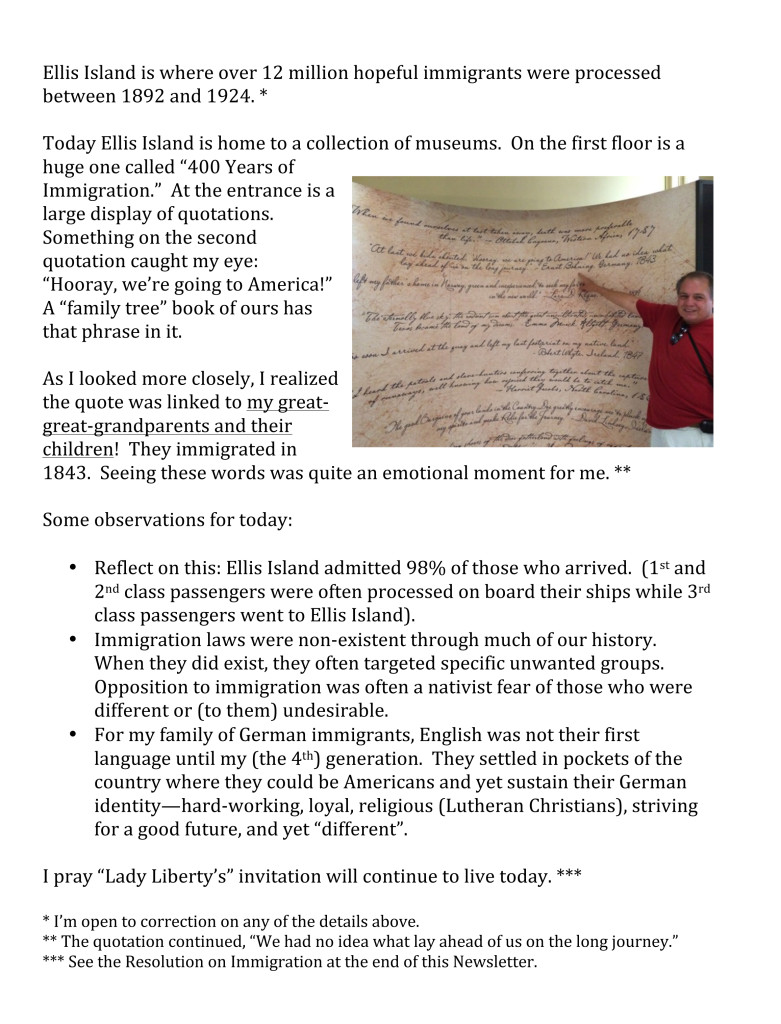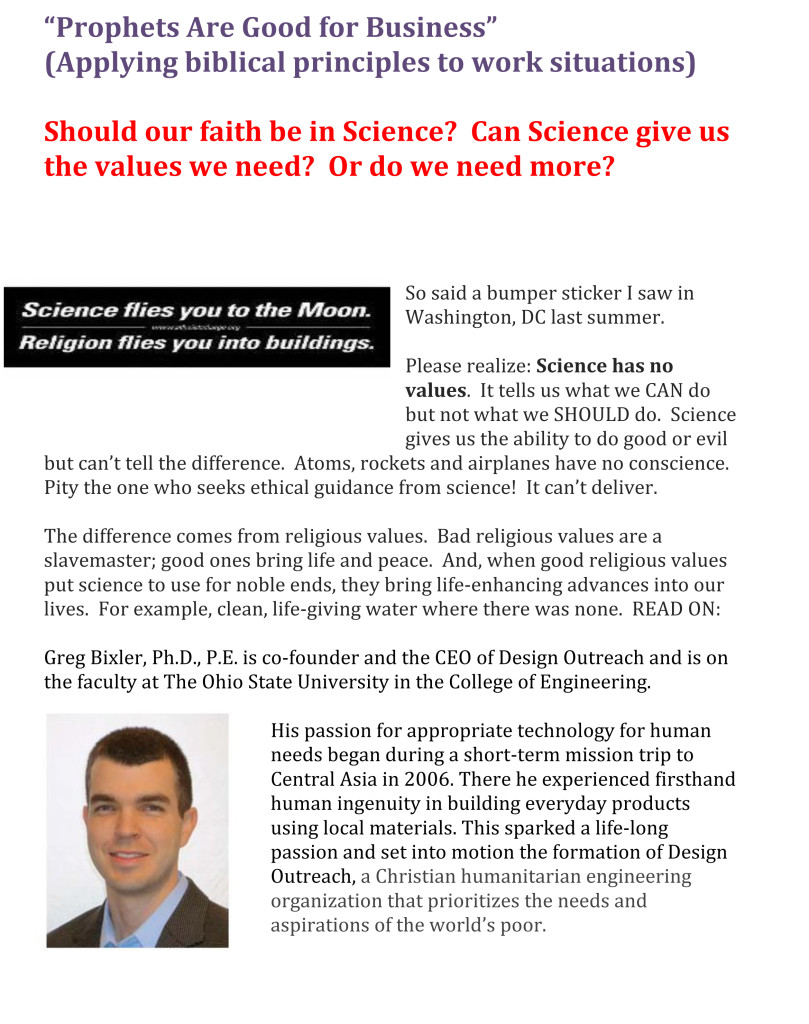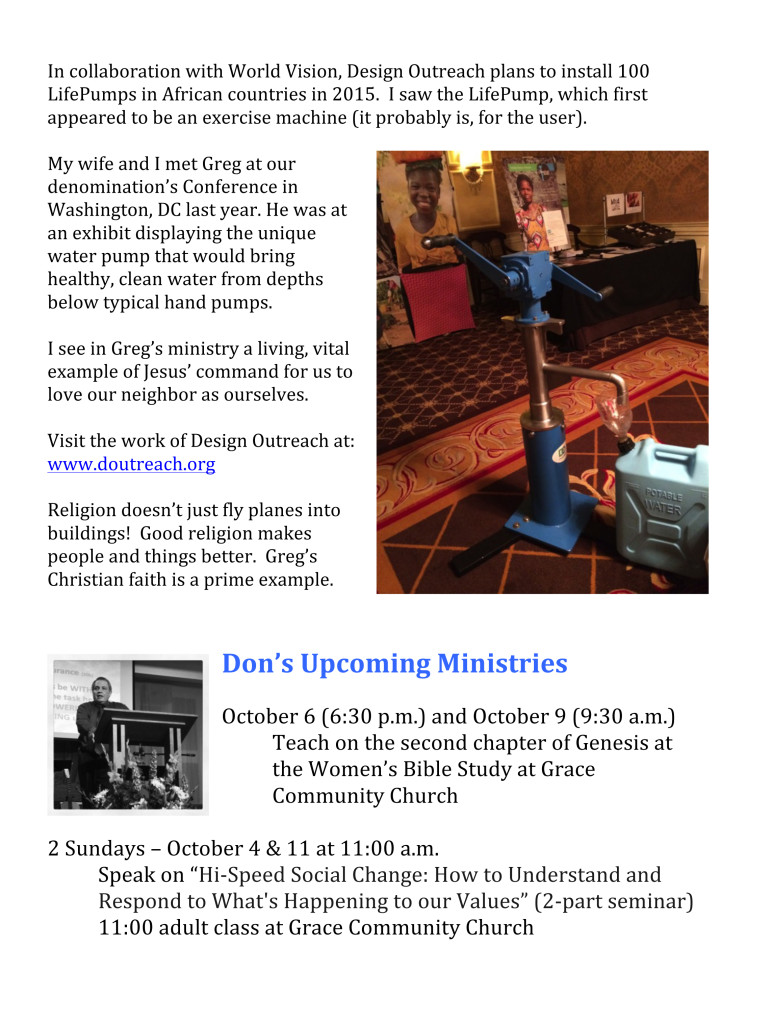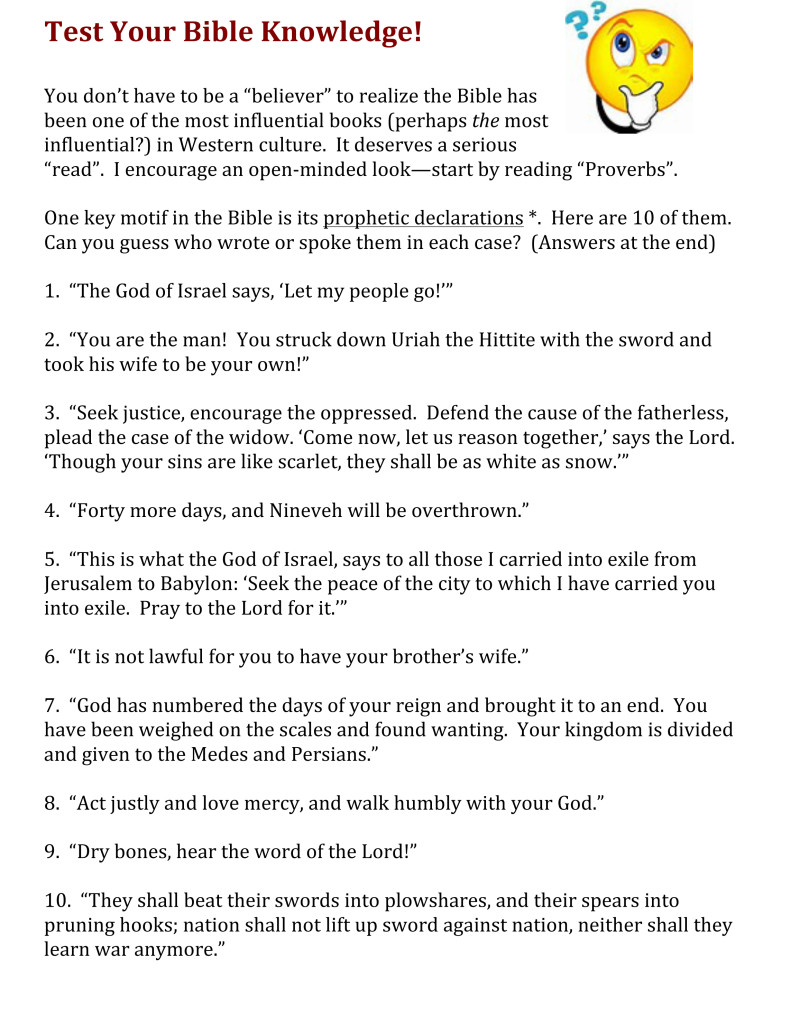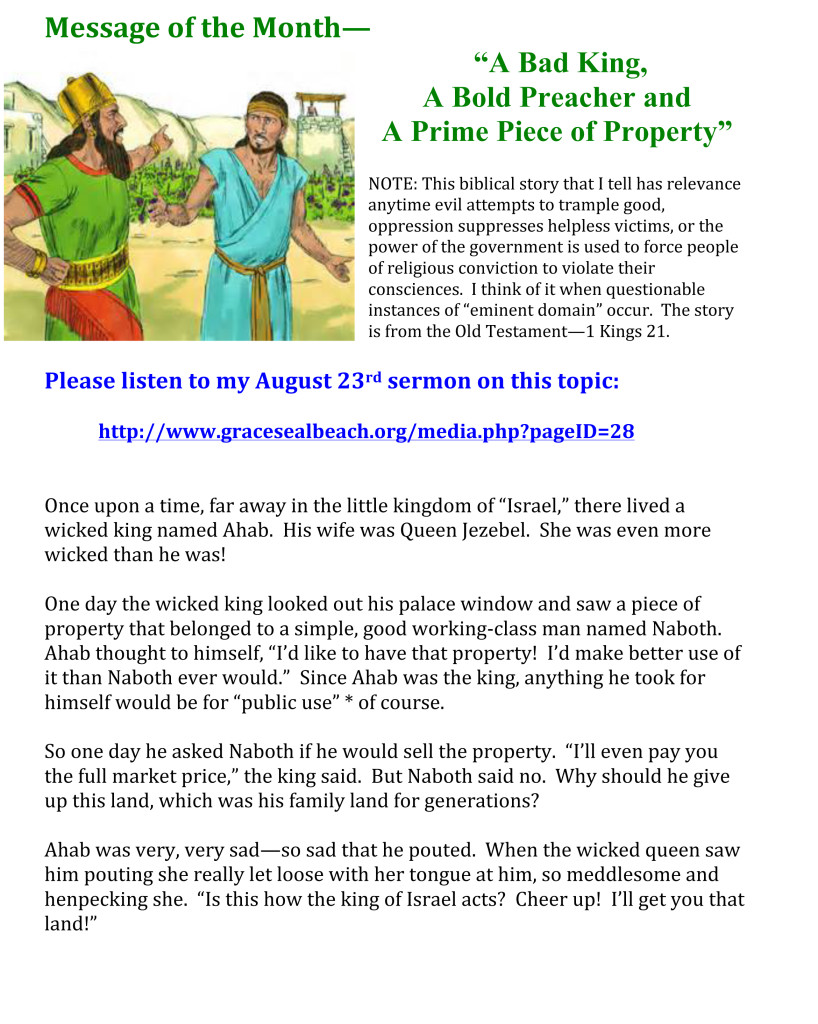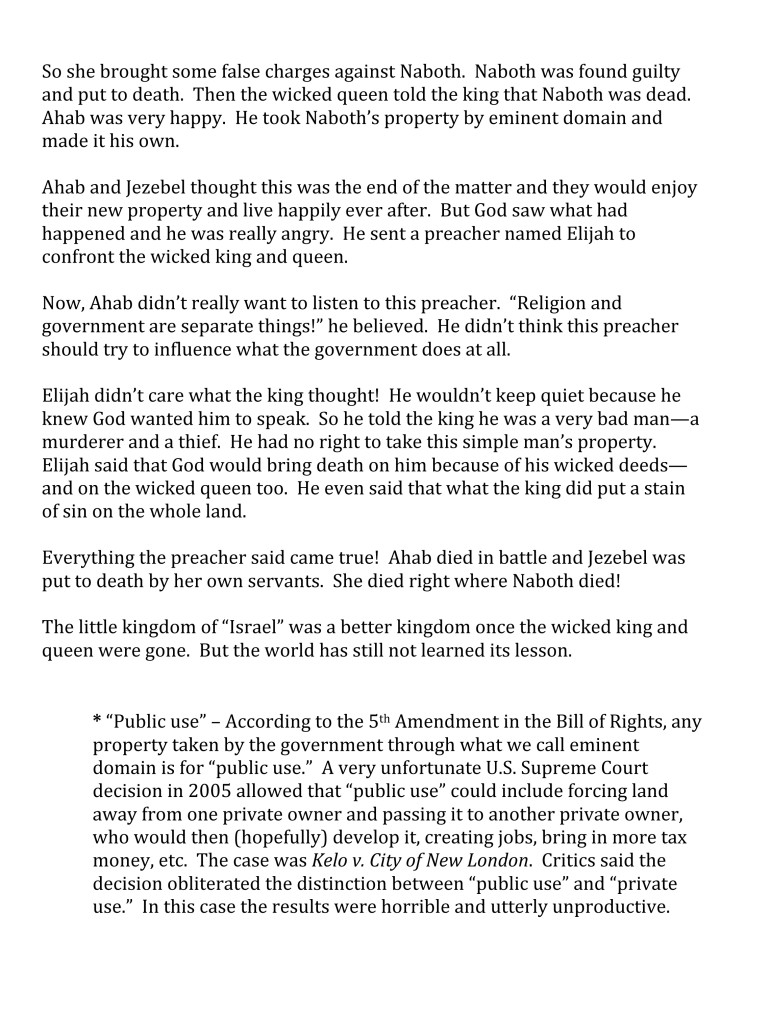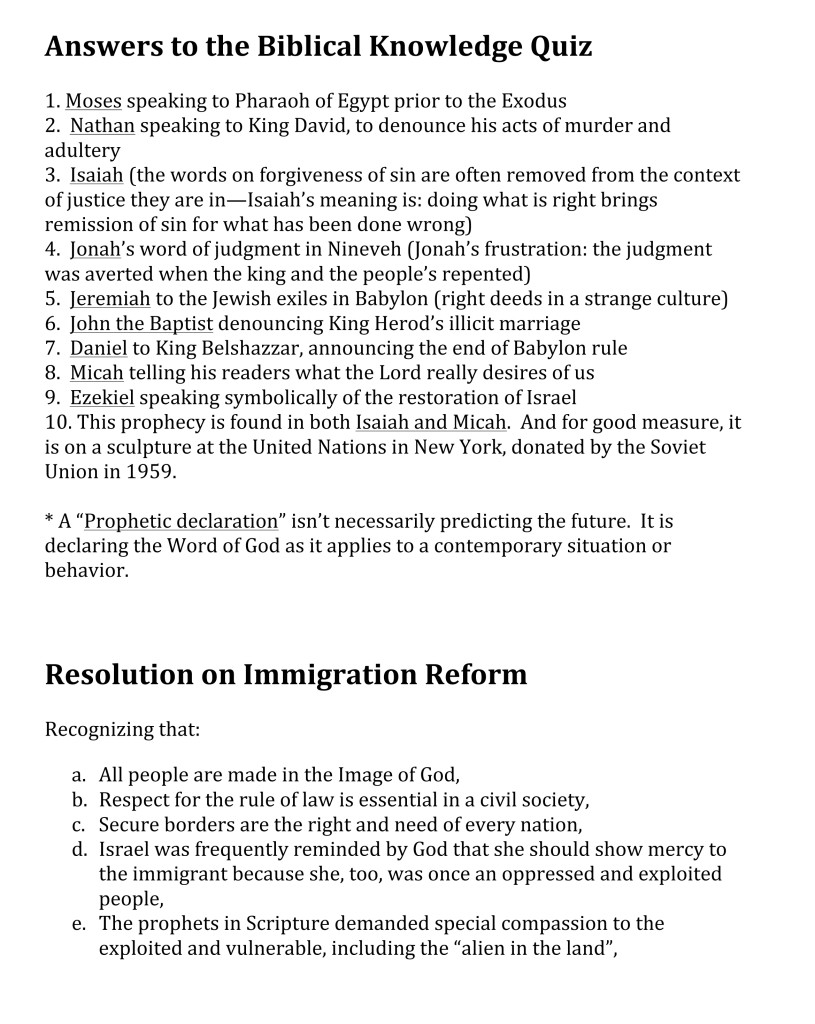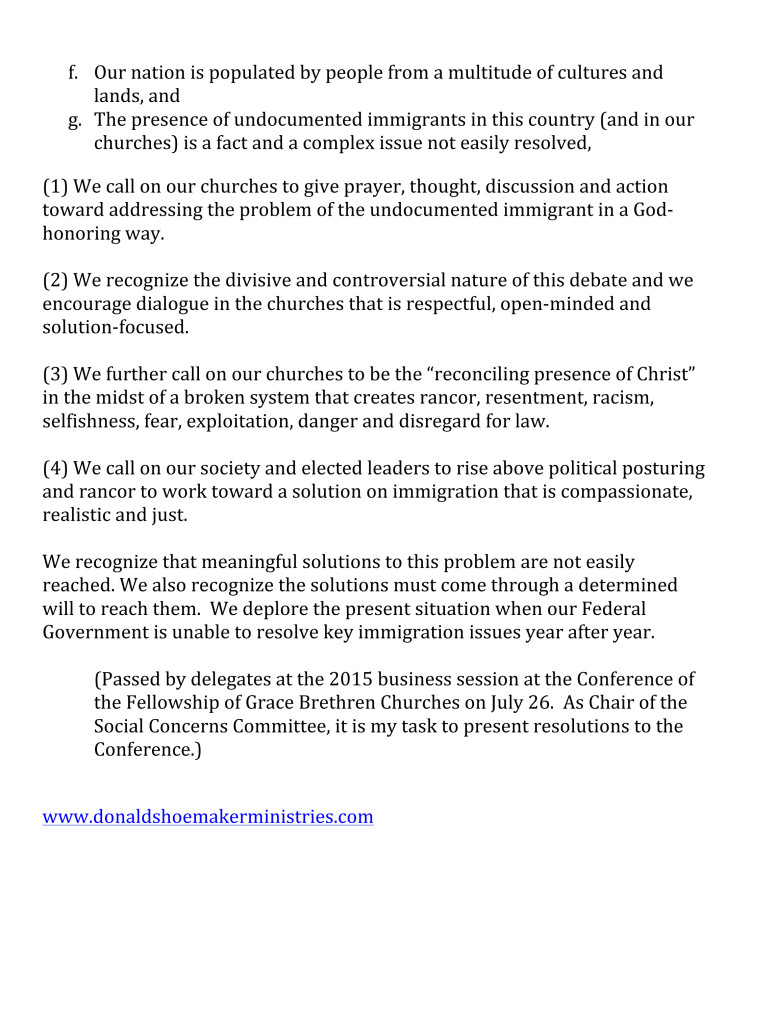Wise Words from an Iconic Political Liberal
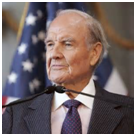 “If I were back in the U.S. Senate or in the White House, I would ask a lot of questions before I voted for any more burdens on the thousands of struggling businesses across the nation.
“If I were back in the U.S. Senate or in the White House, I would ask a lot of questions before I voted for any more burdens on the thousands of struggling businesses across the nation.
“For example, I would ask whether specific legislation exacts a managerial price exceeding any overall benefit it might produce. What are the real economic and social gains of the legislation when compared with the costs and competitive handicaps it imposes on business people?”
– The late Senator and Presidential Candidate George McGovern (1993)
Religious Liberty Vigilance –
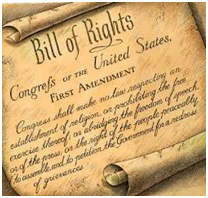 “Congress shall make no law respecting an establishment of religion, or prohibiting the free exercise thereof, or abridging the freedom of speech, or of the press; or the right of the people peaceably to assemble, and to petition the Government for a redress of grievances.”
“Congress shall make no law respecting an establishment of religion, or prohibiting the free exercise thereof, or abridging the freedom of speech, or of the press; or the right of the people peaceably to assemble, and to petition the Government for a redress of grievances.”
– 1st Amendment
January 16 – Religious Freedom Day in America
Since 2008 I have addressed the Long Beach City Council each year on the topic of Religious Liberty. My idea was, I would prepare a Proclamation on Religious Freedom Day. It would get edited each year by someone in city government, but its essence would be the same and it would be acknowledged before the City Council.
This year’s Proclamation is on the next page. My spoken words before the city council, the audience there, and anyone listening on cable TV are on the page after that.
I want this idea to spread! My prayer and wish is that citizens—pastors and church-goers and non-church-goers—would so see the importance of religious liberty that they would bring this topic before their communities each year at the appropriate time.
I then want this topic to be part of annual civics lessons in our public schools. I want it featured and discussed in our churches. I want civic organizations to devote time to it and debate the issues it raises.
Would you do this in your community next year?
Proclamation
Presented for
Religious Freedom Day
WHEREAS the Virginia Statute of Religious Freedom our country’s first legal safeguard for religious liberty, was adopted on January 16, 1786; and
WHEREAS since 1993 the President of the United States has issued a proclamation on the importance of religious liberty, which designates January 16 as Religious Freedom Day; and
WHEREAS our nation’s founders recognized the importance of religious freedom and secured this liberty in the words of the First Amendment, declaring that “Congress shall make no law respecting an establishment of religion, or prohibiting the free exercise thereof”; and
WHEREAS the United Nation’s Universal Declaration of Human Rights (Article 18) declares, “Everyone has the right to freedom of thought, conscience and religion” including the right “to manifest his religion or belief in teaching, practice, worship and observance” and, regardless of this, religious freedom continues to face challenges, persecution and coercion, violent and non-violent, around the world; and
WHEREAS our country has embraced a unique tradition of religious liberty that has prevented religious domination, conflict and persecution and nurtured an environment where religion has flourished and where people have been left free to choose which faith they shall follow or none at all; now, therefore, be it
Resolved, I, Mayor Robert Garcia, on behalf of the people of the City of Long Beach do hereby declares January 16, 2016 to be “Religious Freedom Day” in our community, and encourage city government, community groups, schools and places of worship to reaffirm their devotion to the principles of religious freedom and educate and reflect on the importance of religious liberty so it may continue secure as part of our nation’s fabric, and I encourage residents and government to be mindful of the principles of religious liberty in their decisions, attitudes and actions.
Dr. Robert Garcia
Mayor
January 5, 2016
Comments by Donald Shoemaker at City Council Long Beach, California on January 5, 2016
Our country stands unique in the world, as a republic where religious freedom was embraced and enshrined long ago in many of our founding documents, and where differences over religion have been allowed and protected.
January 16 has been designated “Religious Freedom Day” because on January 16, 1786 the Virginia Statute of Religious Freedom, our nation’s first safeguard of religious liberty, was adopted. It was written by Thomas Jefferson, who thought it so important that it is mentioned on his tombstone.
Jefferson said, “It does me no injury for my neighbor to say there are twenty gods or no God. It neither picks my pocket nor breaks my leg.”
And Jefferson spoke of freedom of conscience, saying, “No provision in our constitution ought to be dearer to man, than that which protects the rights of conscience against the enterprises of the civil authority.”
Religious Liberty is facing many challenges today. For examples:
- Some groups in our world want to impose one religious viewpoint on others by force, including death.
- Some countries don’t honor religious liberty, for example they forbid conversion from one faith to another.
- In our country, we need to debate how religious liberty interfaces with other rights, but in so doing we must not forget religious freedom is the “first freedom” in our nation’s Bill of Rights.
Finally, I want to emphasize that religious conviction was at the root of the activism of Dr. Martin Luther King, whose birthday we celebrate on January 15. I have read most of his writings including his splendid autobiography, and this point is clear.
I would personally wish that on his birthday, instead of giving students a holiday to do whatever they want, the schools would devote the day to teaching civics and the Constitution and talk about Rosa Parks and Martin Luther King.
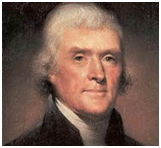 Quotations (with comments) from the Virginia Statute for Religious Liberty
Quotations (with comments) from the Virginia Statute for Religious Liberty
“Whereas Almighty God hath created the mind free; that all attempts to influence it by temporal punishments or burthens, or by civil incapacitations, tend only to beget habits of hypocrisy and meanness, and are a departure from the plan of the Holy author of our religion, who being Lord both of body and mind, yet chose not to propagate it by coercions on either, as it was in his Almighty power to do…”
Here Jefferson’s understanding of religious liberty rests on a theological precept—a concept of God, if you please.If God is, liberty is.
Almighty God had the power to coerce our minds and behavior—to make the world one giant North Korea—but he did not do so. Instead he created our minds free (with freedom of will and decision). Arguing from the greater to the lesser, Jefferson’s statute insists that if God didn’t coerce the mind, the state must not do so either. The state cannot coerce faith or compel financial support of religion.
“…to compel a man to furnish contributions of money for the propagation of opinions which he disbelieves, is sinful and tyrannical…”
Could the day come when the state itself would compel monetary support specifically for what a citizen deems a violation of faith? Could this have relevance in the case of religious organizations and people fighting legally to avoid support of the contraception mandate? Yes.
“…to suffer the civil magistrate to intrude his powers into the field of opinion, and to restrain the profession or propagation of principles on supposition of their ill tendency, is a dangerous fallacy, which at once destroys all religious liberty…”
Speech control on public campuses comes to mind as I read this statement. The government entity (such as a campus committee) determines that certain words have “ill tendency” (such as micro-aggressions) and bans them or disparages them. This not only attacks religious liberty but other First Amendment liberties as well.
“…all men shall be free to profess, and by argument to maintain, their opinion in matters of religion, and that the same shall in no wise diminish enlarge, or affect their civil capacities.
The U.S. Constitution banned religious tests for federal offices (VI, 3) and thus reflects this religious neutrality.
Neutrality cannot mean hostility, and nobody’s quest for political office should be impeded by his or her religious beliefs. When Christian fundamentalists frowned on Mitt Romney’s Mormonism or John F. Kennedy’s Roman Catholicism, when secular liberals poke fun at or discredit an evangelical candidate because of his beliefs, when eyebrows were raised over Ronald Reagan’s hesitancy to embrace evolution—all these run contrary to the spirit of religious neutrality.
I also notehere the mockery and animus directed against “Intelligent Design” as an explanation for origins. (“ID” argues that certain features of the universe and of living things are best explained by an intelligent cause, not an undirected process such as natural selection.) I suspect Jefferson would basically agree with ID arguments.
By this statement, the Statute protects not only religious expression by Christians, but also all religious expression or an expression of non-religion. An attempt to have an opening reference to “Jesus Christ, the holy author of our religion” was rejected by most of the delegates who ultimately adopted the Statute.
 Don’s Upcoming Ministries
Don’s Upcoming Ministries
February 10 – Lead Ash Wednesday Communion Service at Grace Community Church of Seal Beach (7:00 p.m.)
March 20 – Speak at Grace Community Church of Seal Beach
April 1 – Give Keynote Address at New Life Beginnings banquet, St. Mary Medical Center in Long Beach.
Message of the Month – “Spiritual Freedom— The Most Important Freedom of All”
Many teachers of the Bible believe that the spiritual freedom taught in the Bible has become a basis, by way of extension, for the social and political freedoms we embrace. Not the other way around. As I have indicated, Jefferson’s belief that God created our minds free rather than coerced led him to advocate a state that does the same.
How should I, as a Christian, understand “Spiritual Freedom”?
1. We are freed from our efforts to save ourselves.
We are saved by grace, not by struggle. Good works result from a saving relationship with God. They are not the cause of it (Ephesians 2:8-10).
Nor do we start by grace and advance by struggle. Christians seem to enjoy promoting teachings that load us up with man-made burdens on how to grow spiritually, etc., etc. But instead, the same grace that saves us leads us forward. Galatians 3:3 is the answer to all these rules and formulas and methods: “After beginning with the Spirit, are you now trying to attain your goal by human effort?” Of course not!
2. We are freed from the legal and ceremonial details of Moses’ Law.
I accept the Reformation’s distinctions between the moral, ceremonial and civil aspects of God’s Law as found in the Law of Moses. (The subject itself is way too big for this newsletter!)
Moses’ civil law governed Israel as a theocracy (sample: Exodus 21-22). We do not live under a theocracy. Yet, the civil lawoften reflects deeper moral principles. We look for these gems set in the ring of the civil law.
Moses’ ceremonial law governed the religious affairs of the people (sample: Leviticus 1-4). We do not practice the ceremonies. Yet, we learn much about how we ought to worship God from these teachings, and we see the fulfillment of the ceremonies in the New Testament.
Moses’ moral law (such as in the 10 Commandments) reflects God’s abiding will for the world—enduring moral principles. Respecting life, parents, property, marriage, truthfulness—these we should always do.
3. We are freed from the judgment of others as we live out our own lives guided by the life of Jesus and God’s commands.
Judgmentalism, whether in the form of unhealthy church authority (churches seem to love laying behavior rules on their people)or the narrow opinions and raised eyebrows of other Christians who appoint themselves inspectors of your life—such judgmentalism is contrary to the forgiving grace and spiritual freedom God provides (sample: Romans 14:1-13a).
Instead, each Christian is free to live his or her own life before God. We must do what God commands; we must not do what God forbids. But in the middle is a broad range of activity where you and I are free to do or not do this or that and we are “in the will of God” either way. There are some principles that guide us (such as, don’t use your freedom in a way that sets back the spiritual progress of a new Christian), but the broad principle of freedom of choice in how we live remains.
Look at Christian decision-making this way: we live our Christian lives on a big, flat table. Around the table is a protective edge to keep us from falling off. This edge is God’s commandments. But we are free to walk anywhere on that table and make our own decisions as we walk.
4. We are freed from an enslaving “self comes first” view of life so we canbecome true servants of Jesus and others.
Martin Luther’s great statement was: “A Christian is the most free lord of all, and subject to none; a Christian is the most dutiful servant of all, and subject to everyone” (“On Christian Freedom” – 1520).
The same Jesus who declared spiritual freedom washed his disciples’ feet. The same Apostle Paul who declared himself spiritually free put that freedom in the service of others (1 Corinthians 9:19-23).
www.donaldshoemakerministries.com
Addenda
Donald Trump’s “2 Corinthians” Comment My Letter to the Editor
Enough already of criticizing Donald Trump for saying “Two Corinthians” instead of “Second Corinthians.”
My modern Bible versions say “2 Corinthians” at the top of the pages of this New Testament letter. Older versions typically used the Roman numeral II. Neither one automatically suggests “Second Corinthians.” Sometimes a military person may say “One February” instead of “February first.”
Mr. Trump is merely unacquainted with religious vernacular. More important is Mr. Trump’s misuse of 2 Corinthians 3:17, “Where the Spirit of the Lord is, there is freedom (liberty).” Whoever provided him this Bible quotation did not do him good service, even if the speech was at Liberty University.
Donald Trump seeks to be the nation’s chief executive, not its chief chaplain or official theologian. Critics and the news media should heed this and stop.
Table of Contents for all Newsletters in 2015
(These are all available at my Website, or you may email me and request a specific Newsletter: donaldshoemakerministries@verizon.net)
December 2015
Evil in the Christmas Story
Good in the Christmas Story
Song in the Christmas Story
Tribute to Officer Garrett Swazey, Colorado Springs
November 2015
“God’s Saving Grace and God’s Common Grace” (recent article)
Ohio is Football Country–a semi-humorous incident
Good Government-Don’t Be Cynical
(a recent miscommunication from my congressman)
October 2015
The original “Saint Francis” and his great hymn on God’s creation
Scripture gives light on these “Heaven and back” experiences
Recent thoughts on County Clerk Kim Davis—
Her stance on same-sex marriage; her religion
September 2015
An unexpected great experience while visiting Ellis Island at The Statue of Liberty
Should our faith be in science, or do we need something else?
How one invention serves God and people.
Test your Bible knowledge! Can you name the prophet who spoke profound words?
Message of the Month: “A Bad King, A Bold Prophet, and A Prime Piece of Property”
July-August, 2015
Two Great Commemorations: The Magna Carta (800th Anniversary),
The Declaration of Independence
After the Killings in Charleston SC – Should We Forgive?
Church on the Move – What One Indiana Congregation Did in Iraq
US Supreme Court Decision on Same-Sex Marriage – Two Initial Responses
June 2015
Religious Liberty Vigilance – My Apache Friend, Eagle Feathers
and the Federal Government
America’s Great Need: Responsible Fathers
Bible Insight – Key Texts on the Death Penalty
May 2015
What Happened in Indiana? Religious Freedom Needed, and More Civility Too
Bible Insight – God’s Providential Care
April 2015
Easter Message: Suffering and Hope
Bible Insight: “Forgive us our sins”
Religious Liberty Vigilance: Threat to San Francisco Archdiocese’s
Religious Freedom
March 2015
Religious Liberty Vigilance: Atlanta Fire Chief Terminated over Religious Views on Sexual Behavior
Seven Principles to help you understand The Ten Commandments
Tribute to Pro-life Leader Dr. John Willke
February 2015
Thoughts on the Ethics of Abortion 42 Years after Roe v Wade
Bible Insight: Sticks and Stones May Break My Bones,
but Words Can REALLY Hurt Me!
What Our President Should Tell Raul Castro
January 2015
Louis Zamperini–The Rest of the Story
Resolution–A New Paradigm for Worship (It’s time to “change” and “restore”)
Death in Ferguson and New York City (lessons)



 Advancing Christian Faith and Values,
Advancing Christian Faith and Values,
 A time out, a time for mourning, is in order please! Mourning serves a role in the grief process and in the body politic. If the government continues “politics as usual” after such a significant passing, then flags at half-mast are but empty gestures.
A time out, a time for mourning, is in order please! Mourning serves a role in the grief process and in the body politic. If the government continues “politics as usual” after such a significant passing, then flags at half-mast are but empty gestures. Quiz Time! – Match the Candidate to the Commenta
Quiz Time! – Match the Candidate to the Commenta “By mistake” John Heideman, his family and his dear friends came to Grace Community Church that February Sunday morning in 1988. I say “by mistake” because they had intended to visit a different church and ended up at the church where I was pastor. They came, they worshipped, they liked, they stayed.
“By mistake” John Heideman, his family and his dear friends came to Grace Community Church that February Sunday morning in 1988. I say “by mistake” because they had intended to visit a different church and ended up at the church where I was pastor. They came, they worshipped, they liked, they stayed. A Renewed Paradigm for Worship [revised]
A Renewed Paradigm for Worship [revised] The church is never beyond the need for renewal, and I think renewal of our worship is especially needed now.
The church is never beyond the need for renewal, and I think renewal of our worship is especially needed now.
 Opening Words of the Homily by the Rev. Paul Scalia at the funeral for his father Justice Antonin Scalia February 20, 2016
Opening Words of the Homily by the Rev. Paul Scalia at the funeral for his father Justice Antonin Scalia February 20, 2016

 “Congress shall make no law respecting an establishment of religion, or prohibiting the free exercise thereof, or abridging the freedom of speech, or of the press; or the right of the people peaceably to assemble, and to petition the Government for a redress of grievances.”
“Congress shall make no law respecting an establishment of religion, or prohibiting the free exercise thereof, or abridging the freedom of speech, or of the press; or the right of the people peaceably to assemble, and to petition the Government for a redress of grievances.” Quotations (with comments) from the Virginia Statute for Religious Liberty
Quotations (with comments) from the Virginia Statute for Religious Liberty Don’s Upcoming Ministries
Don’s Upcoming Ministries “In the beginning was the Word, and the Word was with God, and the Word was God.”
“In the beginning was the Word, and the Word was with God, and the Word was God.” Unless the speaker is close by, don’t expect his words to address your community context very closely. And don’t expect the “virtual pastor” to be there for you in the hour of need.
Unless the speaker is close by, don’t expect his words to address your community context very closely. And don’t expect the “virtual pastor” to be there for you in the hour of need. thathe sent his only begotten son” (John 3:16) rather than transmitting the likeness of one who wasn’t really with us.
thathe sent his only begotten son” (John 3:16) rather than transmitting the likeness of one who wasn’t really with us. “And Isaac dug again the wells of water that had been dug in the days of Abraham his father, which the Philistines had stopped after the death of Abraham… But when Isaac’s servants dug in the valley and found there a well of spring water, the herdsmen of Gerar quarreled with Isaac’s herdsmen, saying,
“And Isaac dug again the wells of water that had been dug in the days of Abraham his father, which the Philistines had stopped after the death of Abraham… But when Isaac’s servants dug in the valley and found there a well of spring water, the herdsmen of Gerar quarreled with Isaac’s herdsmen, saying, Harry Saltzgaver is Editor-in-Chief of the Grunion Gazette, a weekly Long Beach-area newspaper. He is a committed Christian and for 12 years has been a faithful and active member of Grace Community Church of Seal Beach. He has served in many community roles.
Harry Saltzgaver is Editor-in-Chief of the Grunion Gazette, a weekly Long Beach-area newspaper. He is a committed Christian and for 12 years has been a faithful and active member of Grace Community Church of Seal Beach. He has served in many community roles. The second source of imported water is the State Water Project through the Sacramento River Delta. The starting point for this water is the mountains around Lake Oroville in northern California… [From Lake Oroville the water travels eventually to the Delta east of San Francisco Bay.] Pumps at the Delta take water and put it into the California Aqueduct to make its way south.
The second source of imported water is the State Water Project through the Sacramento River Delta. The starting point for this water is the mountains around Lake Oroville in northern California… [From Lake Oroville the water travels eventually to the Delta east of San Francisco Bay.] Pumps at the Delta take water and put it into the California Aqueduct to make its way south. What are the main reasons for waste?
What are the main reasons for waste? What else would you like to say?
What else would you like to say? Then Herod, when he saw that he had been tricked by the wise men, became furious, and he sent and killed all the male children in Bethlehem and in all that region who were two years old or under, according to the time that he had ascertained from the wise men. Then was fulfilled what was spoken by the prophet Jeremiah:
Then Herod, when he saw that he had been tricked by the wise men, became furious, and he sent and killed all the male children in Bethlehem and in all that region who were two years old or under, according to the time that he had ascertained from the wise men. Then was fulfilled what was spoken by the prophet Jeremiah: Behold, an angel of the Lord appeared to Joseph in a dream and said, “Rise, take the child and his mother, and flee to Egypt, and remain there until I tell you, for Herod is about to search for the child, to destroy him.” And he rose and took the child and his mother by night and departed to Egypt and remained there until the death of Herod.
Behold, an angel of the Lord appeared to Joseph in a dream and said, “Rise, take the child and his mother, and flee to Egypt, and remain there until I tell you, for Herod is about to search for the child, to destroy him.” And he rose and took the child and his mother by night and departed to Egypt and remained there until the death of Herod. Fourth, with Mary his wife, he raised Jesus in accordance with the Law of God. Jesus was circumcised according to the Law (Luke 2:21), and presented for consecration in the temple according to the Law (Luke 2:22-24). His parents nurtured good spiritual habits. Annually they brought him (not “sent him”!) to Jerusalem for the Passover Feast.
Fourth, with Mary his wife, he raised Jesus in accordance with the Law of God. Jesus was circumcised according to the Law (Luke 2:21), and presented for consecration in the temple according to the Law (Luke 2:22-24). His parents nurtured good spiritual habits. Annually they brought him (not “sent him”!) to Jerusalem for the Passover Feast. Churches will “raise the rafters” this month singing “Angels We Have Heard on High”. Singing Christmas carols is a cultural tradition. For people who take the Christmas story to heart, singing is a joyful celebration of its message.
Churches will “raise the rafters” this month singing “Angels We Have Heard on High”. Singing Christmas carols is a cultural tradition. For people who take the Christmas story to heart, singing is a joyful celebration of its message. Each week, upwards of 100 million people in America make it a point to attend church, listen responsively to the sermons, and pray sincerely. But when it comes time to sing the hymns, the level of engagement drops hugely and seems to be continuing in its decline, quite dramatically.
Each week, upwards of 100 million people in America make it a point to attend church, listen responsively to the sermons, and pray sincerely. But when it comes time to sing the hymns, the level of engagement drops hugely and seems to be continuing in its decline, quite dramatically. I also encourage family singing in addition to worship at church gatherings. One way to do this is by setting up the “Advent Wreath” with its five candles. Each week before Christmas one candle is lit. Then Christmas Eve the fifth and center candle. Scripture reading, prayer and singing can fill the home each time.
I also encourage family singing in addition to worship at church gatherings. One way to do this is by setting up the “Advent Wreath” with its five candles. Each week before Christmas one candle is lit. Then Christmas Eve the fifth and center candle. Scripture reading, prayer and singing can fill the home each time.
 Good News from Grace
Good News from Grace A Very Merry Christmas to All!
A Very Merry Christmas to All!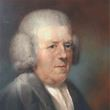 John Newton
John Newton

 along a busy interstate highway. Remember, now, this is football country. So when motorists saw the way Jesus’ arms and hands were lifted, the statue was quickly dubbed “Touchdown Jesus”!
along a busy interstate highway. Remember, now, this is football country. So when motorists saw the way Jesus’ arms and hands were lifted, the statue was quickly dubbed “Touchdown Jesus”!


 Savior.”
Savior.”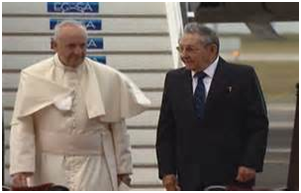
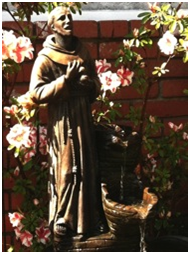
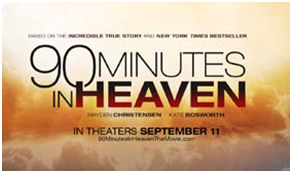 Once again a movie has emerged about a person who went to heaven and came back to tell the story.
Once again a movie has emerged about a person who went to heaven and came back to tell the story.
 Grace Community Church has its idyllic location one block inland from the pier, on palm-treed 8th Street.
Grace Community Church has its idyllic location one block inland from the pier, on palm-treed 8th Street.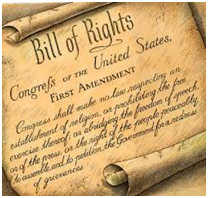
 Kim Davis had been in the Rowan County KY clerk’s office for 16 years working under her mother, the elected county clerk. In 2014 Ms. Davis ran as the Democratic candidate and was elected County Clerk in her own right.
Kim Davis had been in the Rowan County KY clerk’s office for 16 years working under her mother, the elected county clerk. In 2014 Ms. Davis ran as the Democratic candidate and was elected County Clerk in her own right.